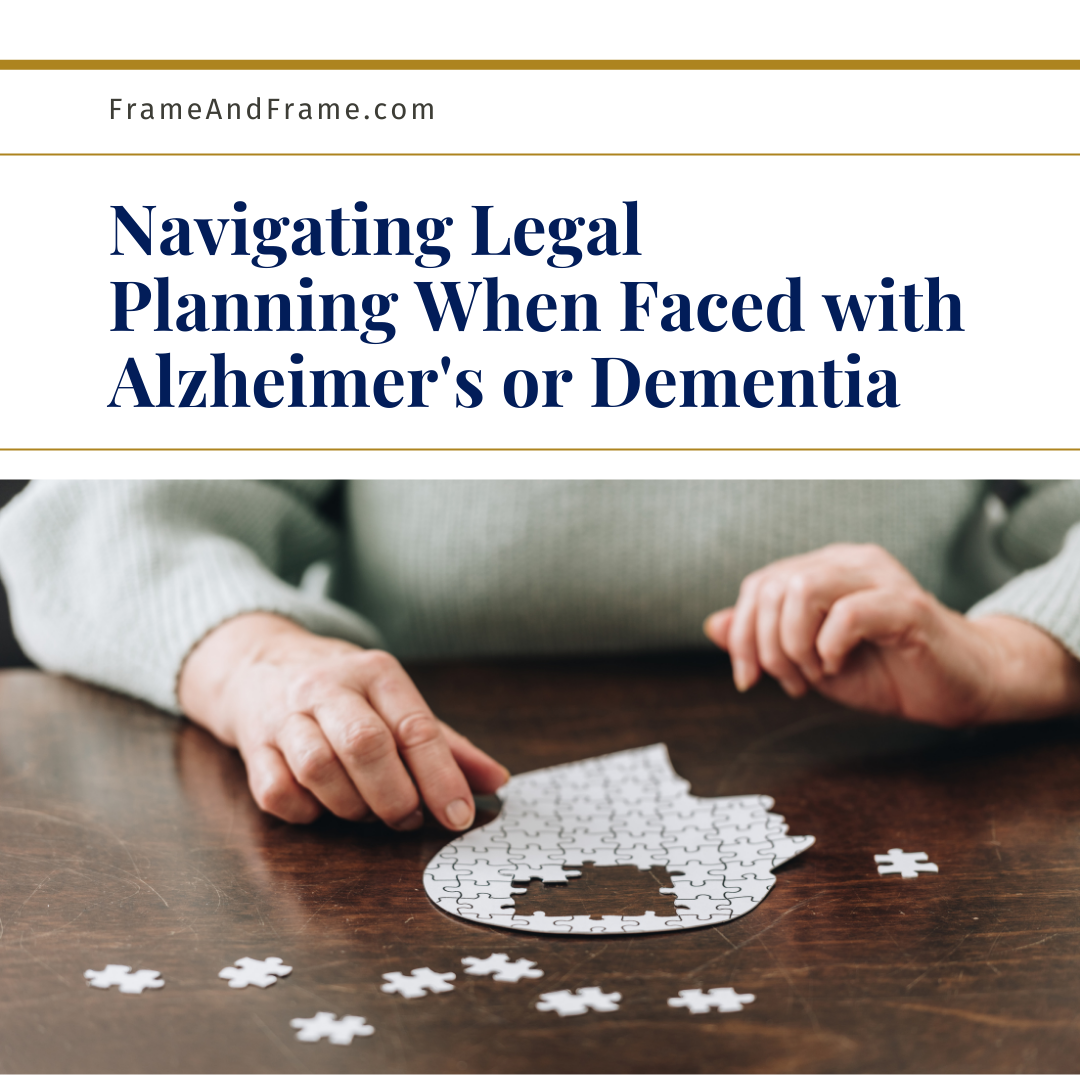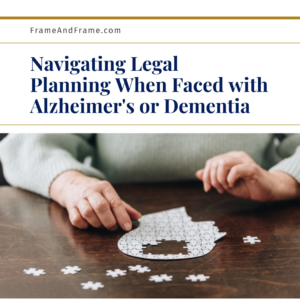
Navigating Legal Planning When Faced with Alzheimer’s or Dementia
 When a family member is diagnosed with Alzheimer’s or dementia, it can be a challenging and emotionally taxing experience. Amid the emotional and practical concerns, it’s crucial to address the legal aspects of care and support. Legal planning and elder law play a vital role in ensuring the well-being of your loved one and the peace of mind for your family. In this article, we will explore how to approach legal planning and elder law in the face of Alzheimer’s or dementia.
When a family member is diagnosed with Alzheimer’s or dementia, it can be a challenging and emotionally taxing experience. Amid the emotional and practical concerns, it’s crucial to address the legal aspects of care and support. Legal planning and elder law play a vital role in ensuring the well-being of your loved one and the peace of mind for your family. In this article, we will explore how to approach legal planning and elder law in the face of Alzheimer’s or dementia.
Understanding Alzheimer’s and Dementia
Before delving into the legal aspects, it’s essential to understand Alzheimer’s and dementia. These are progressive neurological conditions that affect memory, cognitive function, and the ability to perform daily tasks. As the diseases advance, individuals may require increasing levels of care and support.
The Importance of Early Legal Planning
Legal planning should ideally begin as early as possible after a diagnosis, as individuals with Alzheimer’s or dementia may eventually lose the capacity to make decisions about their care and finances. Early planning allows for the individual’s preferences and desires to be documented while they still have the capacity to do so.
Key Aspects of Legal Planning and Elder Law:
- Advanced Directives:
- Living Will: A living will outlines a person’s medical care preferences, such as end-of-life decisions. It’s essential to have a living will in place to guide medical professionals and family members when the individual can no longer communicate their wishes.
- Durable Power of Attorney for Health Care: This legal document designates a trusted individual to make medical decisions on behalf of the person with Alzheimer’s or dementia. The appointed agent should be someone who understands the individual’s values and preferences.
- Financial Planning:
- Durable Power of Attorney for Finances: Similar to the healthcare power of attorney, this document appoints someone to manage financial affairs when the individual can no longer do so. It allows the agent to pay bills, manage investments, and make financial decisions.
- Trusts: Establishing trusts, such as revocable living trusts or irrevocable trusts, can help protect assets and ensure they are managed for the individual’s benefit. Trusts can also simplify the process of asset distribution after the individual’s passing.
- Guardianship or Conservatorship:
- In cases where legal planning hasn’t been adequately addressed, and the person with Alzheimer’s or dementia is no longer capable of making decisions, it may be necessary to pursue guardianship or conservatorship. This involves a court appointing a guardian or conservator to make decisions for the individual. Navigating the complex world of guardianship in Maryland can be a daunting task. Whether you are seeking to become a guardian for a loved one or are concerned about your own future, understanding the legal intricacies and requirements is essential. This guide will help you delve into the significance of guardianship in Maryland and explore the reasons why having an attorney by your side throughout this process is crucial.
- Estate Planning:
- Wills: A will is a legal document that outlines how a person’s assets and property should be distributed after their passing. Having a clear and up-to-date will is essential for ensuring the individual’s wishes are honored.
- Beneficiary Designations: Review and update beneficiary designations on life insurance policies, retirement accounts, and other assets to ensure they align with the individual’s intentions.
- Long-Term Care Planning: Explore options for financing long-term care, such as Medicaid, long-term care insurance, and other resources. Proper planning can help protect assets and ensure the individual receives the necessary care. Thinking about the need for long-term care may be uncomfortable. Thinking about how you are going to pay for it can be even more unsettling. This guide shows you strategies for long-term care, Medicaid planning, and other tools and legal instruments that can help you avoid any crisis.
- Medicaid Planning:
- Medicaid is a government program that provides health coverage to low-income individuals, including those who require long-term care. Medicaid planning involves structuring finances to meet Medicaid eligibility requirements while preserving assets for the individual’s needs.
- Elder Abuse Prevention:
- Sadly, individuals with Alzheimer’s or dementia are vulnerable to financial exploitation and abuse. Legal planning should include measures to protect the individual from scams, abuse, and exploitation.
The Role of Legal Professionals
Navigating the complex landscape of legal planning and elder law when Alzheimer’s or dementia is involved is challenging. It’s highly advisable to seek the expertise of legal professionals who specialize in elder law. These professionals can guide you through the legal processes, ensure all necessary documents are in place, and help protect the individual’s rights and interests.
Crucial Considerations for Legal Planning
The importance of early legal planning cannot be overstated. Waiting until the disease has progressed significantly may limit the individual’s capacity to make critical decisions. It’s important to have open and honest discussions with the individual with Alzheimer’s or dementia are essential. Understanding their preferences for medical care, living arrangements, and financial matters can inform the legal planning process.
Ensure legal documents are reviewed and updated regularly to ensure they remain current and aligned with the individual’s intentions. Legal planning often involves family members and close friends. Clear communication and cooperation among family members are vital to make informed decisions that serve the best interests of the individual.
Legal planning is just one aspect of caring for someone with Alzheimer’s or dementia. It should be complemented by medical, psychological, and social support to ensure the individual’s overall well-being.
Legal planning and elder law are essential components of caring for a family member with Alzheimer’s or dementia. By taking proactive steps and seeking professional guidance, you can provide the necessary care and support while preserving the individual’s dignity, autonomy, and financial security. Legal planning is not only a legal necessity but a profoundly compassionate act that ensures your loved one’s well-being during the challenging journey ahead.
We are experienced in assisting with all aspects of elder law to help achieve the best possible outcome for seniors and their families. Legal guidance is so important for these issues. The statutes change frequently regarding trusts, capital gains, estate planning, probate, guardianships, senior living, life planning, and long-term care. Medicare, Medicaid, and Veteran’s benefits eligibility guidelines change frequently as well. The Maryland elder law attorneys at Frame & Frame have the experience and resources necessary to help you weigh all of the options to make the best decisions possible for you and your family.
